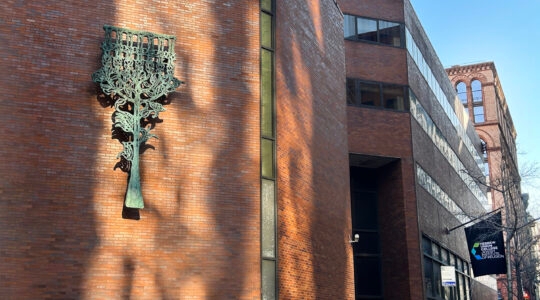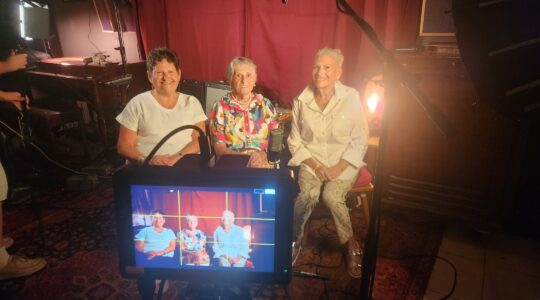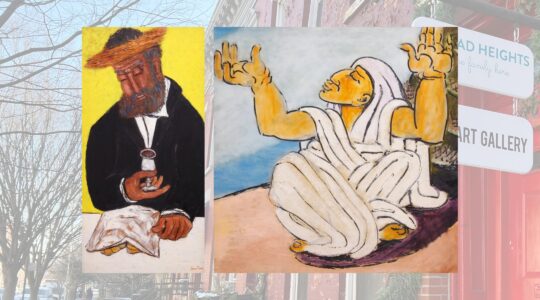Dudu Zar’s voice on the phone is so eerily familiar that it actually triggers a flashback. I’m 7 years old again, sitting cross-legged on the floor in front of the TV, where on the one and only channel he’s singing to a bunch of hand puppets about Israel. “We have a country, we have a home,” he educates us all. “Who is building it and who is planting it? All of us together.”
Times have changed though, for Israel and for Zar. Today he lives in Los Angeles, where an old-time Israeli icon can still scratch out a living. “I represent certain values, a certain brand of Zionism, that in Israel there’s no more demand for,” he explains.
Zar, 64 — songwriter, singer and actor — is best known for his role as host in “Parpar Nechmad” (which translates awkwardly into ”nice butterfly”), one of Israel’s earliest and most famous educational TV programs. Interacting with a star-studded cast of a goose, A turtle, A snail and chickling sock puppets, Zar and other human anchors imparted early concepts of Zionism, Judaism, patriotism and love of Israel. Broadcast from 1983 to 2004 on the government-run educational channel, the show emblazoned itself on countless tender minds, but particularly on my generation, which, besides the news in Arabic, had nothing else to watch.
Zar remained with the show for its entire 21 years, even as other hosts moved on to bigger and better gigs. The thing was, he actually liked being “Dudu from Parpar-Nechmad”; he liked teaching kids those clear, earnest messages. But Israel itself was moving in a different direction. “We’re copying things from America and Europe, everything is becoming one big mish-mash, and the values essential to our kids are being tossed aside,” he told me. “I’m not saying this is wrong, or blaming anyone for it; it’s just the way it is.”
When he did leave the show it was on a sour note. During the years he devoted to the show, for which he says he was paid little, the educational channel would not allow him to use the songs he himself wrote and composed for the show. This left him with meager professional choices: it was either start over at the age of 60 or try elsewhere. So he moved.
In an interview with the Israeli paper Yediot Achronot, Zar was asked how his father, Mordechai Zar — a devout Zionist and a member of the 4th Knesset — would feel about him leaving the country. “He’d be very angry with me. He’d say I betrayed my country,” replied Zar. “I’d tell him that my country betrayed me.”
Though many people are disappointed in their homelands, “My country betrayed me” is an oddly Israeli expression. I Googled it: the first page was all ours.
“It could be because Israelis identify so utterly with the idea of Israel,” suggests Oded Na’aman, a philosophy Ph.D. student at Harvard. “We feel like we shaped it, it belongs to us, it speaks in our voice. And if suddenly your own voice is no longer the same as the country’s, if what you say doesn’t matter anymore, you feel betrayed.”
Na’aman, 32, has spent much of his adult life as an Israeli icon, albeit one of a different sort than Zar. He was a combat soldier in the West Bank, a team commander in a rocket unit, and finally a leading activist in Breaking the Silence, the controversial organization that collects and publishes testimonies from Israeli combatants. So some of the people who once viewed him as a hero now call him a leftist traitor: it’s confusing when a symbol changes its meaning.
Na’aman’s story begins a decade ago, when, as a soldier manning a barricade between two Palestinian villages, he had to tell a 10-year-old boy that the passage was closed. The child started crying. “I thought to myself: ‘What harm can he do?’ He was just a kid trying to get to school,” Na’aman recalls. “I had my orders, but I was also told to be humane, and use my own judgment in carrying them out.” He let the child through, and felt good about it.
An hour later 10 more kids showed up, all of them crying. “They heard how to get through my barricade, and now they were all trying to manipulate me” he says. “I’m the one who’s supposed to be in charge here — I couldn’t let them make a fool out of me.”
Alright then, no free passes for crying kids, Na’aman told himself. He still tried to be nice and smile at them, until he realized Palestinians were sending children to soften him up. After that it was no more Mr. Nice Guy. No more smiles.
He put up a gruff front, but held on to his guilt. “Let’s say someone seemed suspicious to me, and I’d detain them: tie their hands and feet, blindfold them, have them sit on the floor. At first I’d think about how this must feel to them. Eventually I figured this was just dumb: what difference did it make to them that I felt bad about it? I might as well go on with my life.”
Na’aman kept his equilibrium until a month after his release, when he attended a convention on the Israel Defense Force’s code of ethics. The speaker, a high-ranking military figure, stated that a professional soldier manning the barricades would know when to follow orders and when to employ his own judgment.
Na’aman raised his hand. “But what if a crying kid comes by, or a woman in labor? My judgment might be to let them pass, but one can never be entirely sure who is really harmless, and the orders were to always put security as a top priority.”
An even higher-ranking officer interrupted. “What’s the problem?” he chuckled. “Worse comes to worst she gives birth in the barricade.” The room erupted into laughter.
“I felt myself beginning to shake,” Na’aman recalls. “I guess I lost it. I started yelling: ‘Why are you laughing? These are real people, I’m a real person, we’re not a joke!’”
At that moment, he said, he indeed felt betrayed by his country. But today, with distance, Na’aman sees things differently. He no longer perceives Israel as a loved one, or an idea made flesh, but as a state: a mechanism created to provide certain services to its people. If a loved one betrays you, it’s over. But a broken mechanism can be fixed.
Such cool-headed observations are easier to make from here, Na’aman admits. It’s a lot quieter; there’s a lot more space for one’s thoughts. But he still feels like an exile.
“Every time I visit Israel, I feel like a captive animal released back to its natural habitat. Just hearing Hebrew all around me brings tears to my eyes. … I have no doubt that it’s my place, my people, my language. I do plan to return, and try to live there.”
Zar insists that he never actually left. “Why say ‘I left’? Israel’s my home. I still hear the news in Hebrew, I still watch Israeli TV, I’m in touch with everyone.” He’s even singing about Israel and Jewish values once more, to an audience of Jewish-American and Israeli expatriate kids. “I didn’t leave, I just moved a little further away for a year or few.”
“So what was that about the country betraying you?”
“That’s not how I meant it to come out,” he says. “You know, I was just a little angry when I said it.”
I tell them both that anger is a good sign. The day I stopped being angry at Israel was the day I knew I wasn’t going back.
Orli Santo is a correspondent for the New York-based weekly Yediot America. Her column appears monthly.
The New York Jewish Week brings you the stories behind the headlines, keeping you connected to Jewish life in New York. Help sustain the reporting you trust by donating today.




